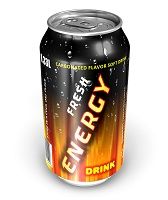Article
Energy Drinks Toxic to Kids
Author(s):
High-caffeine energy drinks can cause serious cardiac and neurological symptoms in children. At the 2014 American Heart Association Scientific Sessions in Chicago, IL, Steven Lipshultz, MD, called for new labeling on the drinks that would spell out risks, particularly for the adolescent consumers manufacturers target for marketing.

High-caffeine energy drinks can cause serious cardiac and neurological symptoms in children.
At the 2014 American Heart Association Scientific Sessions in Chicago, IL, Steven Lipshultz, MD, chair of pediatrics at Wayne State University and pediatrician-in-chief at Children’s Hospital of Michigan in Detroit, reported on data from the National Poison Data System from October 2010 to September 2013.
Lipshultz called for new labeling on the drinks that would spell out risks, particularly for the adolescents targeted by manufacturers for marketing.
Additionally, the packaging is a potential hazard, he said. The beverages are usually sold in pop-top cans, not screw-top bottles. That means that children are more likely to accidentally ingest the drinks.
Energy drinks often contain pharmaceutical-grade caffeine at concentrations 4 times higher than that in a cup of coffee, Lipshultz said. They may also include ingredients and additives for which there is “little to no safety testing,” he said in an interview posted on the American Heart Association website.
The study data showed a disproportionate number of calls to the 55 centers that are part of Association of Poison Control Centers regarding consumption of the drinks involved possible or actual cases of children drinking the beverages. Of 5,156 reported cases of energy drink exposure, 40 percent were unintentional exposures by young children Lipshultz said.
“We expected to see a lot of calls involving teenagers and young adults, but we were surprised to see so many involving children under age 6,” he said.
In cases where the drinks had been mixed with alcohol, “moderate to major outcomes were reported in 42% of cases,” he said. Those outcomes included abnormal heart rhythm, conduction abnormalities (57%) and neurological events including seizures (55%).
“Energy drinks have no place in pediatric diets,” he said, adding that he had treated children who accidentally drank the beverages. Energy drinks may contain pharmaceutical-grade caffeine, and additional caffeine from natural sources that may cause the heart to race and blood pressure to increase. Energy drinks with multiple caffeine sources were tied to a higher rate of side effects, typically involving the nervous, digestive or cardiovascular systems.
Some energy drinks contain up to 400 mgs of caffeine per can or bottle, compared to 100-150 mg in a typical cup of coffee, Lipshultz said. Caffeine poisoning can occur at levels higher than 400 mg a day in adults; above 100 mg a day in adolescents; and at 2.5 mg per kilogram (2.2 pounds) of body weight in children younger than 12, he said.
Researchers don’t yet know whether compounds other than caffeine in the drinks contribute to the ill effects. Many of the added ingredients have never been tested for safety in children and have never been tested in combination.
In 2010, the US Food and Drug Administration banned pre-packaged energy drinks that contain alcohol. Since then, calls to poison control centers about such drinks fell sharply, which supports the effectiveness of the combination ban. But some people might custom mix alcohol-energy brews, Lipshultz said.
Reports to poison control centers vastly underestimate the problem because many people who become ill from energy drinks don’t call the hotlines and emergency room visits are not included. “The reported data probably represent the tip of the iceberg,” Lipshultz said.





